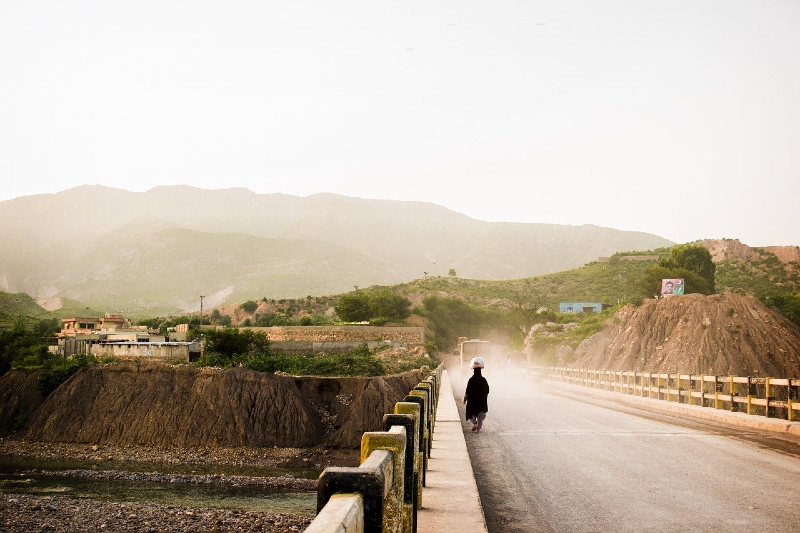This article discusses domestic and family violence.
The world has stopped. People around the globe are sitting tight at home to avoid contracting the novel coronavirus. Pakistan, thankfully, is no different. The sixth most populous country is trying to manage the crisis with the little resources it has.

Yet, many women and children in Pakistan might not be safe within their own houses. They are being forced to be locked in with their abusers, with little to no hope of intervention from authorities or the outside world, as everyone is engaged in fighting with the virus.
In Pakistan only 24 per cent of the total population of women is in the workforce, while all others assume numerous unpaid roles, primarily as the caretaker of the house and family. Not to forget that even women in the workforce, skilled or otherwise, have to resume their household duties as soon as they are at home.
An average Pakistani woman’s day would be full of chores to please others. It’s childcare responsibilities, making appointments, cooking and cleaning for her children and partner. She is lucky to get an hour or two for herself. Even if she has help, she still is supervising. Plus, tending to the needs of her in-laws, if she lives with them. Be it their medicines, doctors’ appointments, food or clothes.
The routine remains the same even if she works from home or works at an office. She will be expected to carry out her duties perfectly, with or without help.
Pakistani women spend 11 hours on unpaid care and domestic work for every one hour a man spends doing the same, according to data published in the UN Women’s flagship ‘Progress of the World’s Women 2019-2020’ report.
‘What needs to be considered for these women is a better world in a post–COVID-19. Women need to be able to speak freely, get legal and medical aid easily and without the fear of being bumped back into an unwanted abusive relationship.’
Not only is the unpaid labor by women hardly acknowledged, but it is also rare for husbands to help in household chores.
Apart from their duties, women also have to deal with the ‘family politics’ — where the women are blamed for things wrong in the house, martial issues, not being perfect enough — which can include physical and mental abuse. Hence, women face a double threat: a deadly virus outside and an abuser at home.
‘Imagine living in fear of the person who shares your home. Every day is a waking nightmare of criticism, name-calling, disliking food you cook, disapproving of your household chores, controlling what you eat and wear, and physical violence on top. Now imagine that you’re trapped inside with this person while the world is grappling with an ongoing health crisis of COVID-19,’ explains Nabila Feroz, a Pakistani human rights activist.
Women who live with domestic violence have no escape from their abusers during quarantine, especially in countries where social services are poor or nonexistent and where housing situations are deeply insecure. The abuse is unaccounted for in Pakistan with only 51,241 cases of violence against women reported between January 2011 and June 2017. These are just the tip of the iceberg. Some experts claim that every second woman in Pakistan suffers from some form of domestic violence. Even conviction rates remain low, only 2.5 per cent of all reported cases ending up being convicted by the courts, as domestic violence is a taboo subject.
In March, the Pakistan ministry of human rights tweeted a helpline number for the victims of domestic abuse during the lockdown, indicating anticipation in a rise of such cases.
And then just add around the clock care, management, dishes, food and zero solaces to the mix.
The financial stress has increased too, people are finding it harder to get by every day, being laid off or facing pay cuts. The other big issue impacting women is unemployment, where employers refuse to pay them. The situation adds to the tension in the house, and the most vulnerable targets are the women stuck at home.
Feroz says it’s imperative ‘the government should take it seriously to prevent, redress and rehabilitate the victims. There should also be necessary data sharing on reported cases by the government.’
Feroz also recommends that ‘women workers in different businesses like saloons should be paid by the owners, may be partially. Domestic workers should be on leave with pay. These are short-term measures because long term measures demand more time in normal situation. For the long-term women need greater financial independence, greater access to education and greater protections afforded to them by state institutions.’
The barriers women faced have only intensified. Visiting hospitals for physical abuse medical aid is tougher. Going to the police or calling the helpline is usually considered a taboo. Women are taught to live with their abusers, because it is considered dishonorable to leave your husband or his family. Even legal aid is out of service at the moment.
Getting psychiatric and mental health-related help is also tough, if not impossible when you live with your abuser.
The situation can turn dire in the coming days if the lockdown continues. What needs to be considered for these women is a better world in a post–COVID-19. Women need to be able to speak freely, get legal and medical aid easily and without the fear of being bumped back into an unwanted abusive relationship. There are still changes that need to be made once the country comes back to its equilibrium.


well written. great post!